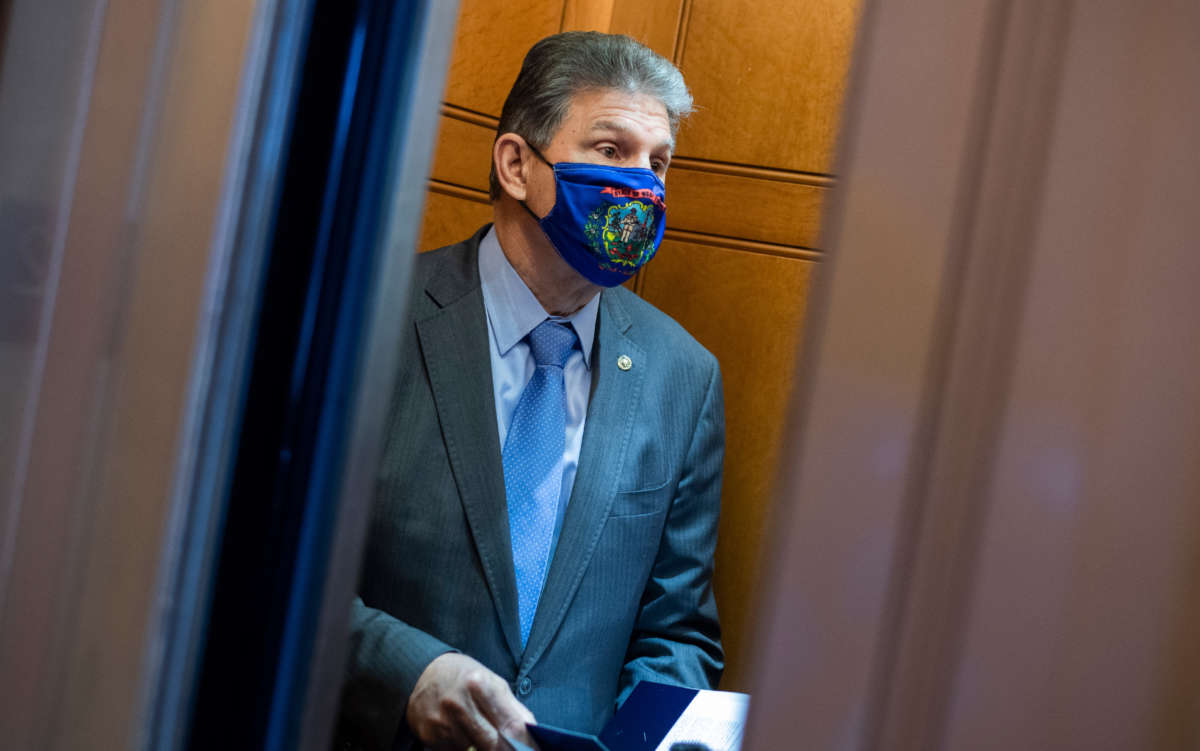Senator Joe Manchin, a conservative Democrat from West Virginia and a key vote in the evenly divided “upper chamber” of Congress, penned an op-ed this week that reiterated he would not support changes to the filibuster, while also indicating he may stand opposed to other means Democrats could use to avoid GOP obstruction of legislation.
“There is no circumstance in which I will vote to eliminate or weaken the filibuster,” Manchin wrote in his opinion piece for The Washington Post. “The time has come to end these political games, and to usher a new era of bipartisanship where we find common ground on the major policy debates facing our nation.”
Manchin’s words are, at best, idealistic. Republicans have not given any indication that they want to negotiate on any legislation, and will likely work to obstruct a number of priorities, including election reforms and an infrastructure package that Democrats and President Joe Biden are pushing for. The op-ed also indicates that there is little hope that Manchin will be of aid in fixing the myriad problems that the country is facing.
Manchin also stressed that he was skeptical of utilizing an obscure Senate rule to bypass the filibuster. Section 304 of the Congressional Budget Act of 1974 allows for new legislation to pass without needing 60 votes to break a filibuster so long as proposals are in the form of amendments to existing law that previously passed through reconciliation.
The West Virginia senator expressed dismay at taking that route in the future. “I simply do not believe budget reconciliation should replace regular order in the Senate,” he wrote.
“If the filibuster is eliminated or budget reconciliation becomes the norm, a new and dangerous precedent will be set to pass sweeping, partisan legislation that changes the direction of our nation every time there is a change in political control,” Manchin warned.
Unfortunately for Manchin, the ideals he longs for are not based in reality. Senate Minority Leader Mitch McConnell (R-Kentucky) has, in the past, nicknamed himself the “grim reaper” due to his propensity to obstruct Democratic House-passed legislation in the past.
Despite assurances McConnell has made that his party will cooperate with the Biden administration, he’s shown no indication that he will engage in true bipartisanship, the way Manchin believes things should be. McConnell has only shown that he will continue to use the filibuster to block Democrats’ legislative goals, which is perhaps why he fought so hard for it at the beginning of this Senate — making Section 304 or the elimination of the filibuster one of the only options Democratic lawmakers have at their disposal.
Manchin’s hard line on the filibuster in his op-ed seems to contradict his previous indications that he’d be open to changing the rule on the Senate procedure to disincentivize its over-use.
“Maybe it has to be more painful, maybe you have to stand there,” he said last month on NBC, seemingly supportive of the idea of a talking filibuster. “There’s things we can talk about.”
In his op-ed, Manchin is less adamantly against the use of reconciliation. While expressing dismay for using Section 304 to pass Democrats’ agenda items, Manchin does not suggest he’d never be open to using it, like he did regarding the filibuster, leaving an opening for his colleagues.
That opening may explain why the White House isn’t expressing too much concern over Manchin’s missive published this week. On Thursday morning, White House communications director Kate Bedingfield indicated that Manchin’s points in his op-ed was just “how the process works.”
“Senators will come forward. They’ll raise their concerns, they’ll raise their issues,” Bedingfield said. Biden was not too worried over what Manchin wrote, she added.
“What the President has said is that the only thing he finds unacceptable here is inaction,” Bedingfield explained. “So he knows this is going to be a process where there are going to be compromise[s]. There is going to be negotiation.”
Join us in defending the truth before it’s too late
The future of independent journalism is uncertain, and the consequences of losing it are too grave to ignore. To ensure Truthout remains safe, strong, and free, we need to raise $43,000 in the next 6 days. Every dollar raised goes directly toward the costs of producing news you can trust.
Please give what you can — because by supporting us with a tax-deductible donation, you’re not just preserving a source of news, you’re helping to safeguard what’s left of our democracy.
